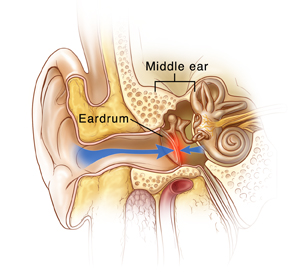Ear Barotrauma

Ear barotrauma is an injury to the soft tissues of the middle ear and eardrum. It occurs when unequal pressures form inside the middle ear and outside the eardrum. This often happens with altitude or pressure changes, such as during an airplane flight or scuba diving. It can also occur after a blow to the head. If you already have congestion from a cold or allergies, barotrauma is more likely to occur.
Symptoms include pressure and pain in the ears. You may feel dizzy. Your ears may feel plugged. You may also have short-term hearing loss. In severe cases, the eardrum may rupture. This can lead to bleeding and infection.
Often, self-care is all that is needed to relieve symptoms. Even a ruptured eardrum will most likely heal on its own. If it does not, surgery may be needed to repair it. In this case, you’ll be referred to a specialist for further care.
Home care
You may use over-the-counter pain medicine unless another pain medicine was prescribed. Talk with your healthcare provider before using these medicines if you have chronic liver or kidney disease or have ever had a stomach ulcer or gastrointestinal bleeding. You may use over-the-counter oral or nasal decongestants and antihistamines to help ease congestion unless you were given prescriptions for such medicines.
To help prevent or treat an ear infection, you may be prescribed antibiotics. Be sure to take all medicines as directed and finish the antibiotic medicines even if you feel better.
Prevention
-
Each ear has an eustachian tube, which connects the middle ear to the back of the throat. Certain self-care steps can help keep the eustachian tubes open and relieve pressure in the middle ear. These steps include:
-
Nose, sinus, or ear congestion makes barotrauma more likely. Use caution if you have a cold, infection, or allergies. If you have any of these and need to fly, take an antihistamine and decongestant 1 to 2 hours before flying. These medicines are available over the counter in both oral pill and nasal spray forms. Ask your healthcare provider which of these medicines is safe for you.
-
When flying, don't sleep during the descent. Use the self-care steps listed above to help open the eustachian tubes.
-
When scuba diving, descend and ascend slowly. Diving when you have any sinus, ear, or nasal congestion is not recommended.
Follow-up care
Follow up with your healthcare provider, or as advised.
When to seek medical advice
Call your healthcare provider right away if any of the following occur:
-
Fever of 100.4°F (38°C) or higher, or as directed by your healthcare provider
-
Increasing pain or ringing in your ears
-
Hearing loss that lasts longer than 2 days
-
Fluid or blood draining from the ear
-
Dizziness
Online Medical Reviewer:
Ashutosh Kacker MD
Online Medical Reviewer:
Rita Sather RN
Online Medical Reviewer:
Tara Novick BSN MSN
Date Last Reviewed:
12/1/2022
© 2000-2025 The StayWell Company, LLC. All rights reserved. This information is not intended as a substitute for professional medical care. Always follow your healthcare professional's instructions.